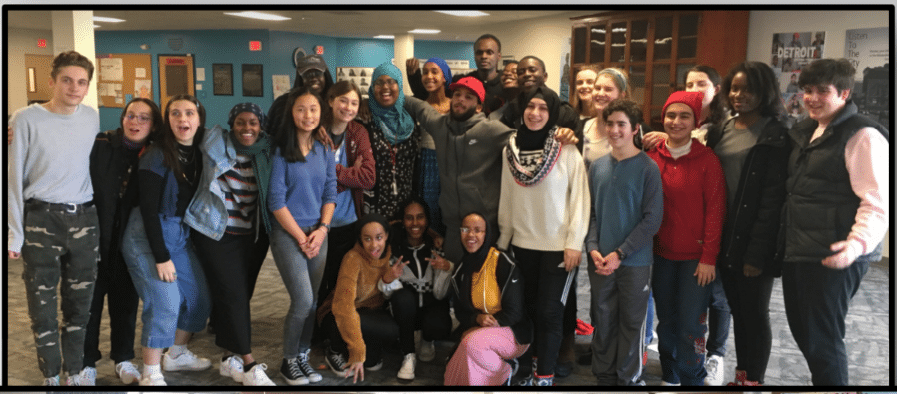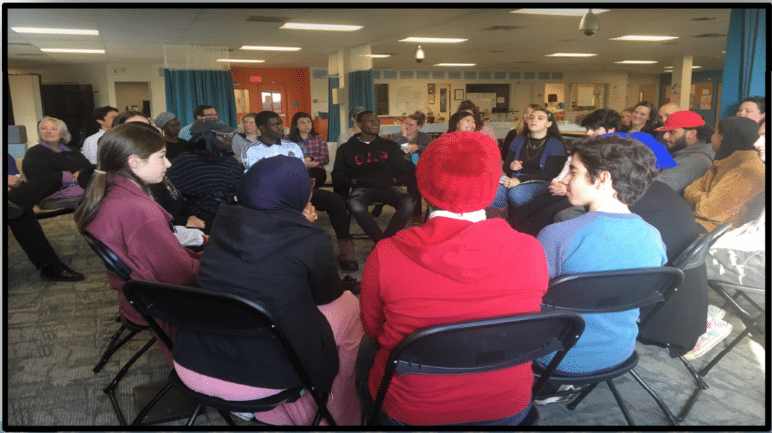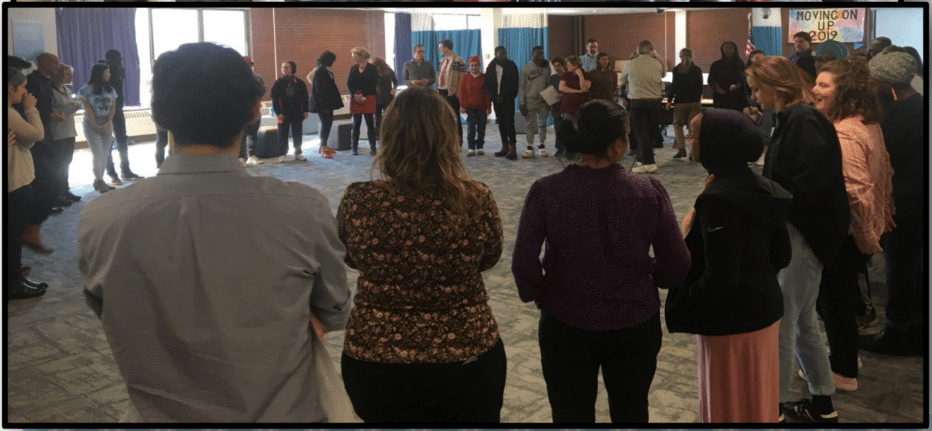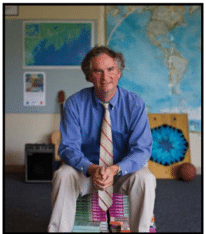Improving School Equity Through A Student-Led PD Activity and an Equity Summit at Casco Bay
CompetencyWorks Blog
This post originally appeared as “Letter from the Principal Derek Pierce” in the January 2019 newsletter of the Casco Bay High School in Portland, Maine.
 Dear CBHS Families and Friends,
Dear CBHS Families and Friends,
Happy New Year! The CBHS faculty is always looking to create meaningful opportunities for student leadership, but last month was the first time we ever offered an entirely student-planned and facilitated professional development session.
The goal was to help faculty better understand the lives our students live, especially our immigrant students and students of color. It began with a student fishbowl. A cross-section of about twenty CBHS students, many members of our Student Union, answered questions posed by senior Imti Hassan. Faculty sat around in a larger circle and just listened, for thirty minutes, as students spoke candidly on questions that ranged from “What do you love about CBHS?” to “Where and when have you experienced injustice or inequities at school?” Faculty received lots of kudos, but also heard some hard truths (delivered with remarkable maturity and civility); they ranged from student frustration at having their names or pronouns continually botched by staff, to a request that our curriculum include more uplifting and nuanced tales of oppressed or marginalized people. Afterwards, small groups of students and staff discussed what they had just heard and went deeper into questions about what teachers and students may not yet see or fully understand about each other’s lives.
 The insights shared during our closing circle from both faculty and staff made clear the profound impact of the experience. This December professional development session was one action step in response to the Equity Summit held on October 30th. During the Summit, the CBHS faculty leadership team met with members of the Student Cabinet to review feedback generated earlier in the fall by the faculty’s equity self-assessment and the student’s courageous conversation on equity. We also used a set of rubrics on school equity developed by the “Schools of Opportunity” program as another tool to reflect on our strengths and areas in need of improvement.
The insights shared during our closing circle from both faculty and staff made clear the profound impact of the experience. This December professional development session was one action step in response to the Equity Summit held on October 30th. During the Summit, the CBHS faculty leadership team met with members of the Student Cabinet to review feedback generated earlier in the fall by the faculty’s equity self-assessment and the student’s courageous conversation on equity. We also used a set of rubrics on school equity developed by the “Schools of Opportunity” program as another tool to reflect on our strengths and areas in need of improvement.
As a staff, improving our equity literacy has been an explicit goal since August 2017. It has also become a priority of all Portland Public School and is integral to the Portland Promise. Last year our work with staff (and students) focused on building our background knowledge on key topics such as implicit bias and privilege while also reflecting on our own particular lenses and experiences with equity and injustice. This year, we are also focused on taking action. One of our targets is: “We will become more skilled at identifying and eradicating inequities and injustice in our school and broader world.”
What follows is a summary of other key findings from our Equity Summit.
The Most Important Ways Our Community is Just and Equitable
- Our curriculum frequently attempts to bring to light issues of social justice and diversity.
- Our curriculum and (untracked) classroom experiences are where equity exists most often.
- Every senior is supported to apply to a college or post-secondary option.
- We frequently have a sliding cost scale for events and excursions based on a students’ ability to pay.
- There are a myriad of opportunities for people of diverse backgrounds to contribute to the school.
- The student leadership in the school reflects the diversity of the student body.
- Support structures, the flexible use of time and differentiated assignments allow a range of students to be challenged and supported.
- There is the option to exceed in all courses
- We are making a priority of improving our equity literacy as a faculty and as a school.
- We are increasingly focused on restorative justice in response to student misbehavior.
The Most Important Ways Our Community is Not So Just and Equitable
(Note: These are listed in order, based on the the priority placed on the issue by the group. Only the issues raised as priorities by three or more participants are listed.)
- Too many students do not have access to material needs which impact their learning (e.g., BK 7, lunch food, Quest gear, calculators, wifi at home, etc.)
- Students may not be comfortable sharing their perspectives if it is not representative of the (e.g., left-leaning) majority of the CBHS population.
- There is often one expectation for all students when more is needed (e.g., with ALEKS and memorization). Greater flexibility is needed due to factors such as mental health issues and language barriers.
- Lunch is not an equitable experience for too many students.
- More accommodations are needed for ELL students.
- Not all students have the experience, athleticism or gear to participate fully or happily in the Quests.
- More study of non-US history would be welcome – and/or more student choice in what history to study
- Student-teacher relationships would be improved if each party better understood the lives the other was living (e.g., responsibilities outside of school).
- White middle class values may be presented by the school as “right” or “normal” without being acknowledged as culturally-based choices.
- Students of color are not often in a position to be the majority of any group.
- Our first-generation, immigrant parents do not have access to the same depth of information and resources about their children’s education as parents for whom English is their first language.
Here are some plans and actions taken so far in response to the Equity Summit.
- We are establishing an equity fund of $1000 in our budget for 2019-20 to cover more of the material needs that can impact a CBHS students’ learning, from Quest gear to calculators and books for college courses.
- We will be partnering with Rippleffect this spring to prepare rising seniors with little outdoor experience so they feel more comfortable about Senior Quest.
- We are piloting a limited food distribution program for our food insecure families with the help of CBHS parents and student groups.
- We will create a safe space for students of color and allies as we have done with the A to Z Alliance.
- Cabinet is working with our Food Services department on ways to make lunch a more equitable and pleasurable experience for more students.
- In Crew this spring, with the help of our student Seeds alumni, we will do some activities across the school that will develop our skills in civil dialogue, that will help us to better listen to one another, even (and especially) when we disagree.
- We are hosting a Shared Space Cafe (1/17) for our multilingual families focused on themes identified as crucial by our multilingual parent ambassadors.
- We have devised a more precise protocol to make the crew advisor the staff member primarily responsible to make sure we get the pronunciation of each student’s name (and their pronouns) as the student wishes. It will then be the crew advisor’s job to teach other faculty at that grade level.
- We will continue to work on improving our equity literacy, as a faculty and as a full school community. This month our staff will be putting together an application for the Schools of Opportunity program based on their equity rubrics.
- We will continue to strive to make improving equity an integral part of our decision-making lens.
___
 And, of course, we hosted the fishbowl. At the end of the fishbowl, after a slew of teachers and students had reflected and shared their gratitude, I felt the moment when I should step in. I wanted to express how proud I was in that moment: proud of our students for having the courage and leadership to share such important truths with such kindness and grace; proud of our faculty for having the courage to listen, to deeply listen, to our students; and proud of everyone for their astounding commitment to bettering our robust and remarkable community. But just as I was leaning in, Imti Hassan bounded forward. And she said precisely what I planned to say. Just more eloquently and through a more captivating smile.
And, of course, we hosted the fishbowl. At the end of the fishbowl, after a slew of teachers and students had reflected and shared their gratitude, I felt the moment when I should step in. I wanted to express how proud I was in that moment: proud of our students for having the courage and leadership to share such important truths with such kindness and grace; proud of our faculty for having the courage to listen, to deeply listen, to our students; and proud of everyone for their astounding commitment to bettering our robust and remarkable community. But just as I was leaning in, Imti Hassan bounded forward. And she said precisely what I planned to say. Just more eloquently and through a more captivating smile.
This year, more than ever, I am so grateful for our student leadership.
Derek Pierce
See also:
- What Happens When You Really Listen? Student Voices and Reshaping Policy
- Step by Step Our Field Builds Its Capacity for Diversity, Equity, and Inclusion
- Educolor: Elevating the Voices of Public School Advocates of Color
- Amplifying Messages on Equity and Anti-Racism from SXSW EDU
- Introducing Moving Toward Mastery: Growing, Developing, and Sustaining Educators for Competency-Based Education
 Derek Pierce is the founding principal of Casco Bay High School in Portland, Maine and was formerly the principal at Poland Regional High School in Poland, Maine. He has taught English, theater, and American Studies in schools from Los Angeles to Gorham. He has lived in Portland with his family since 1993.
Derek Pierce is the founding principal of Casco Bay High School in Portland, Maine and was formerly the principal at Poland Regional High School in Poland, Maine. He has taught English, theater, and American Studies in schools from Los Angeles to Gorham. He has lived in Portland with his family since 1993.